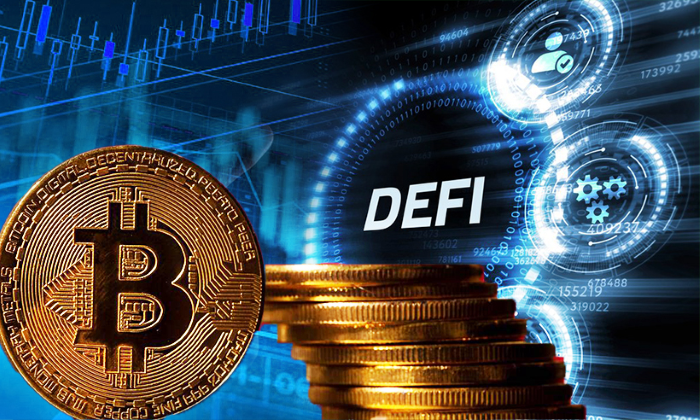If you’re like millions of others, the new DeFi (Decentralized Finance) buzz could have you a bit flustered because – just when you had a solid handle on the blockchain, Bitcoin, and maybe even own a crypto wallet – the language changed!
Well, cryptocurrency is DeFi, to eliminate any confusion first and foremost.
What’s happened is a new terminology has emerged, with “DeFi” being the preferred moniker in the aftermath of Bitcoin’s dalliance with Wall Street.
To be fair, Bitcoin was trafficked and coerced into performing as an asset for legacy investors, and it was a garish and monumentally risky spectacle at times. Not good for the legitimacy of blockchain tokens, although many would argue it did more for their legitimacy than anything else.
It all depends on your point of view, and whether you think notions of decentralized finance are the imminent future, or whether you still imagine the current centralized monopolies will be in play forever more.
Talk to any prominent outfit providing IT support in London, and you’ll understand that payment gateways are now a regular component of their support requests. That’s as it should be, because its associates with professionalism and legitimate value.
It is taking the best of the legacy arena model and using it to ensure that the newer tokens (particularly those running on the Ethereum network) eschew the vulgarity of purely speculative value, and rather insists on genuine utility, user uptake, and functional performance.
Goodbye CeFi, hello DeFi
What does all that mean?
Well, for one, Ethereum was always a sleeping giant.
A more utility-minded (and perhaps smarter) arrival in Bitcoin’s wake, Ethereum was never the darling of investors-it never succumbed to becoming the poster child for raw greed – and its accompanying desperate need for novelty assets – as Bitcoin did.
Ethereum has never had its hour, but DeFi seems to be it.
Crypto or DeFi?
What’s the difference?
It can be confusing at times, but these five short points should help clarify.
DeFi is an umbrella term for all decentralized cryptocurrencies.
The fraternity of yield farmers and the liquidity pools they form is a slow-burn, mutually beneficial, and extremely disciplined method designed to legitimately grow DeFi tokens like Compound and Aave through genuine application.
The separation between crypto and Defi is a semantic turn of phrase.
DeFi is an attempt to subtly distinguish between what has passed for protocol and investor interest around the older tokens like Bitcoin, and smarter, newer tokens that are refocused on privacy, complete decentralization, and ease and speed of use – not today’s latest token price.
The media misuses or confuses the terms.
It doesn’t help matters when reporters say things like “DeFi coins outperform crypto!” because that implies they’re two separate things, whereas they’re not. What they mean is the returns on joining the liquidity pools of the new DeFi tokens are currently greater than those available from buying Bitcoin.
Murky definitions cause even more confusion.
A better technical definition would be that DeFi is blockchain technology applied to financial instruments, crypto assets, and smart contracts so that the technology facilitates completely decentralized financial transactions.
Not all cryptocurrency enthusiasts are the same.
Why don’t DeFi advocates like to talk about “crypto”?
While Bitcoin will forever remain a decentralized currency, for the newer crop of decentralized finance adherents, it’s contaminated by its performance for legacy capital and by the AML and KYC regulation that governing bodies foisted onto its trading some years back, taking the joy and legitimacy out of much of the anonymity and privacy crypto had enjoyed up until then.
Why is Defi “better” than crypto?
Having established that crypto and DeFi are essentially one and the same, DeFi can’t be “better” than crypto, although the arena is better – here’s why.

DeFi is the modern cryptosphere, having picked itself up and dusted itself off after Bitcoin’s assimilation as a legacy investor’s asset. DeFi prides itself on tokens having real-world, legitimate application. This allows for an honest and genuine value gain, rather than a hysterical throwing of money at speculative tokens. Real utility is kind with DeFi, as it’s the rekindling of the egalitarian, smart, and self-sufficient personal financial reality Bitcoin once promised.
How smart and self-sufficient?
Well, Forbes recently pointed out that DeFi has grown from $700 million at the close of 2019 to a whopping $40 billion and counting today.
Considering that it’s achieved that without legacy capital is admirable, indeed. DeFi adherents want to keep DeFi free of the vile greed that mauled Bitcoin soon after it emerged at all costs, building a large bubble through the digital exchanges that sprang up to trade this new asset class.
So far, so good, as DeFi is gaining value as Ethereum’s utility reasserts itself.
The future of DeFi vs CeFi
Now that cryptocurrency as a concept is experiencing consolidation – and the wannabes have fallen by the wayside – DeFi is wiser, has learned from initial blockchain tokens’ mistakes, and enjoying itself immensely.
More than anything, DeFi is saying “We were serious about escaping the parasitic stranglehold of banks, up to and including central ones, and we’re carrying on, wiser now, better too, smarter-here, check this out!”
The ICO epidemic of 2017 also informs its legitimacy, as that was another token mania period littered with trash that dented cryptocurrencies’ credibility, and it seems forever dampened what could have been a popular and decentralized investment strategy and vehicle.
ICOs weren’t intrinsically bad, but much like Bitcoin, they attracted scammers and hungry investors-a recipe for hurt every time. ICOs may very well mainstream in the future, especially thinking of the rise of NFTs and how value can be best depicted and delivered in a digital reality.
And if they do, it will give them new legitimacy and value.
Also Read: Can current tech tell us about the future?





